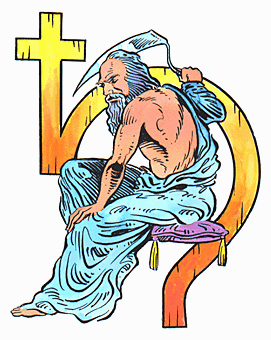Latin god Saturn, Greek god Cronus
Saturn, god of harvest or time of reaping
(sixth planet from the sun).

Harvest time in ancient Italy belonged to the god of reaping, whom the Romans called Saturn. A symbol curved like his sickle represents the planet.

- Saturn (Sower) is closely connected with Demeter (Ceres) and his worship continued at Rome along with that of Zeus or Jupiter.
- He was an ancient Roman god of fertility, especially of agriculture.
- He was believed to be the deity who had introduced agriculture and with it civilization and government.
- He carried a sickle as his symbol.
- Saturn was worshiped in a winter festival called the Saturnalia and his name was/is used for the day of the week, Saturday.
- The Saturnalia started about December 17 and lasted for seven days.
- A harvest-home or winter solstice celebration marked by carnival, exchange of gifts, feasting, license and misrule, and a cessation of all public works.
- Masters served slaves; kings were chosen by lot, usually from among criminals or slaves, to preside over the feast, given ass ears, and then slain.
- A sacrificial victim was chosen to represent both the god himself and the king-surrogate.
- He was slain and sent to the underworld to merge with his divine counterpart.
- Its riotous indulgence is the source of the phrase Saturnalia of crime.
- It is said to have merged into the Christmas festival.
A few scientific facts about Saturn:
- The gas giant Saturn is the second largest planet in the solar sysem after its big brother Jupiter.
- Saturn has more than twenty satellites.
- The biggest is Titan, the solar system’s second largest moon.
- Larger than Mercury, it has an atmosphere denser than that of any other moon in the Solar System.
- Like so many other phenomena in the solar system, the rings of Saturn were first seen by Galileo.
- In 1610, he saw two bright spots on either side of the planet.
- Although his telescope was strong enough to see the disk of Saturn, it apparently was not powerful enough to resolve what the rings really were because he interpreted what he saw as a triple planet.
- Over the centuries, after several astronomers misinterpreted the contents of the rings, it was finally determined that they are, in fact, narrow bands of fine debris.
- Also, over hundreds of years, astronomers thought Saturn was the only ringed planet.
- Voyager found rings around Jupiter, and astronomers using a telescope also spotted evidence of rings around Uranus.
 You may return to the page of planet images from here.
|